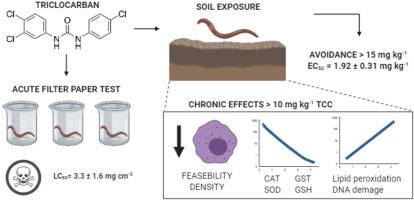Environmental Pollution ( IF 7.6 ) Pub Date : 2020-08-31 , DOI: 10.1016/j.envpol.2020.115570 Sidney Fernandes Sales Junior 1 , Quentin Vallerie 2 , Gabriel de Farias Araujo 1 , Lorena Oliveira Souza Soares 3 , Evelyn Oliveira da Silva 1 , Fábio Veríssimo Correia 3 , Enrico Mendes Saggioro 4

|
Triclocarban (TCC) is a contaminant of emerging concern widely applied as an antimicrobial in personal care products and introduced into the terrestrial environment through the application of biosolids (i.e., treated sewage sludge) in agriculture. Displaying the potential to bioaccumulate in the food chain and a high half-life in the soil, the presence of this compound in the environment may lead to potential ecological risks. In this context, TCC toxicity assessments in Eisenia andrei earthworms were carried out through acute, avoidance and chronic tests following cytotoxicity, antioxidant system, i.e. acatalase (CAT), glutathione-S-transferase (GST), glutathione (GSH), lipid peroxidation (LPO), and DNA damage (comet assay) evaluations. An LC50 of 3.3 ± 1.6 mg cm−2 in the acute contact test and an EC50 of 1.92 ± 0.31 mg kg−1 in the avoidance test during 72 h and 48 h, respectively, were obtained. The behavioral test indicates earthworm avoidance from 15.0 mg kg−1 of TCC. During chronic soil exposure, a 44% reduction in earthworm cell viability was observed after 14 days of exposure to 10 mg kg−1 TCC, while an increase in the percentage of amoebocyte cells also ocurred. Chronic exposure to TCC led to reduced CAT and GST activities, decreased GSH levels and increased LPO in exposed organisms. DNA damage was observed after 45 days from a 1 mg kg−1 dose of TCC. Therefore, TCC exhibits toxicological potential to Eisenia andrei earthworms, mainly during long-term exposures. This study provides mechanistic earthworm information towards understanding the environmental and human health implications of TCC exposure and draws attention to correct biosolid management.
中文翻译:

三氯卡班在长期接触中会影响earth:行为,细胞毒性,氧化应激和遗传毒性评估。
三氯卡班(TCC)是一种正在引起人们关注的污染物,已广泛用作个人护理产品中的抗菌剂,并通过在农业中应用生物固体(即处理过的污水污泥)而引入了陆地环境。该化合物在食物链中具有潜在的生物蓄积性,并在土壤中具有较高的半衰期,因此在环境中的存在可能导致潜在的生态风险。在这方面,在TCC毒性评估赤子安德烈蚯蚓经过急性,避免和以下的细胞毒性慢性测试,抗氧化剂体系,即acatalase(CAT),谷胱甘肽-S-转移酶(GST),谷胱甘肽(GSH),脂质过氧化(进行了LPO)和DNA损伤(彗星测定)评估。LC 50为3.3±1.6 mg cm -2在急性接触试验中,在回避试验中分别在72小时和48小时内获得的EC 50为1.92±0.31 mg kg -1。行为测试表明,从15.0 mg kg -1的TCC中可以避开worm。在慢性土壤暴露期间,暴露于10 mg kg -1 TCC 14天后,worm细胞活力降低了44%,而变形虫细胞的百分比也增加了。长期暴露于TCC会导致暴露的生物体内CAT和GST活性降低,GSH含量降低和LPO升高。1 mg kg -1剂量的TCC在45天后观察到DNA损伤。因此,TCC对Eisenia andrei具有毒理学潜力,,主要是在长期暴露期间。该研究为了解T接触TCC对环境和人类健康的影响提供了机械information信息,并提请人们注意正确的生物固体管理。











































 京公网安备 11010802027423号
京公网安备 11010802027423号